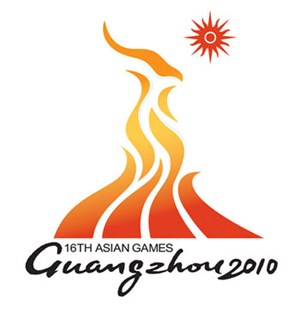Comment
Asian Games – Lost in translation?

Logo of the 16th Asian Games
21.10.2010
During the Asian Games the the Nobel Peace Prize awarded to Liu Xiaobo will hardly be a topic. Yet it may be important to keep Liu's warnings ahead of the Beijing Olympics in mind; a failed Olympics will deteriorate the human rights situation in China. The same may apply to the Asian Games.
Stress disorder
As before the Beijing Olympics, the Chinese authorities have tightened their grip ahead of the Asian Games. I have previously called this Olympic stress disorder; the Chinese government takes every precaution to prevent that the Games contribute to an unstable China. Extra security exercises are made and Chinese police are monitoring potential troublemakers. An important difference from the Olympics, however, is that these measures are not seriously monitored by Western media: there's no Usain Bolt or Michael Phelps involved, only "unknown" athletes.
Language problems
Even though Western media and international human rights organizations do not seem to have given much thought to the sports event in China in November, the Chinese have probably managed to create trouble for themselves with their media policy. In July, a politician from Guangdong stated that television broadcasts from the Asian Games were to be held in Mandarin and not Cantonese. Since most people in Guangdong speak Cantonese, this caused great dissatisfaction. Several times during July and August, up to 1,000 people hit the streets in protest against the decision to hold television broadcasts from the Asian Games in Mandarin.
Behind these protests is a fear that Mandarin in the long run will replace Cantonese as the language of the region. The situation was explosive and in fear that these protests might evolve, authorities in Guangdong disallowed protests marking the anniversary of the Mukden incident in 1931; the bombing of a Japanese-owned railway in Manchuria used by the Japanese in the invasion of Manchuria. The authorities were afraid that the anti-Japan demonstrations would degenerate into anti-Communist Party demonstrations.
Chaos and order
Several journalists have asked me for my opinion on the Commonwealth Games in India this year. Sports-wise they were more successful than many had feared. This indicates that many were more prejudiced towards these Games than they should have been. When comparing them to the Beijing Olympics, however, there are some very interesting aspects to pay attention to.
The biggest difference between the Olympics in China and the Commonwealth Games is that these two events took place in two different political regimes. India is a democracy (albeit with several shortcomings) and China is an authoritarian country. What many have described as chaos in India is to some extent a result of the fact that India is a democracy and that many different interests have fought against each other in the run up to the Games.
The games in Beijing were tightly controlled by central authorities and there was no shortage of money. The way the two societies are constructed also influenced the protests against the Games. In China, authorities were able to unite the Chinese people to support the Games. The only vocal protests came from outside of China and helped to further strengthen Chinese nationalism in the run up to the Games.
In India, the protests largely came from within and contributed to what many in the West have labelled "chaos". One can wonder if our distinction between chaos and order says something about our attitude towards what kind of society we would like sports events to take place in?
Chaos versus order?
Democracy versus authoritarian rule? One important question before the Asian Games this year is whether the language trouble ahead of the Games is a signal that China is also approaching "chaotic" Games. Maybe. At least it shows that the Chinese are not as united as the Chinese government often gives the impression of, for example when commenting on how the Nobel Peace Prize was an offense to all Chinese.
If the language problems lead to further protests, and to an event that will not be considered successful by the Chinese government, the Chinese authorities certainly cannot blame the West. The blame for this can be put on Chinese human rights activists, and this time without the western media coverage.
This article first appeared on Andreas Selliaas' blog 'Sportens Uutholdelige Letthet' on 20 October 2010. Follow Andreas' blog (in Norwegian) on sportensuutholdeligeletthet.blogspot.com





